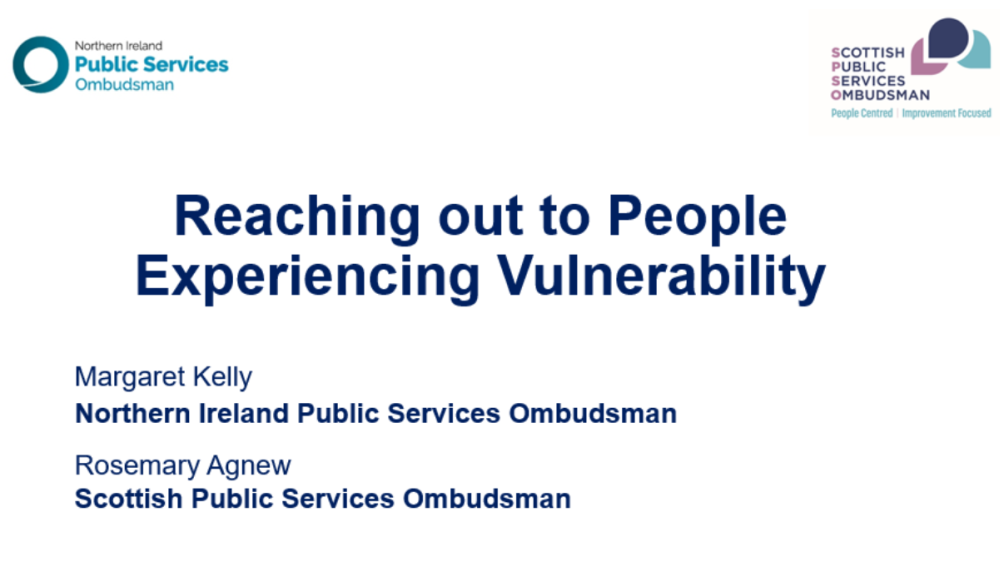Reaching out to People Experiencing Vulnerability

Margaret Kelly and Rosemary Agnew share insights from NIPSO’s and SPSO’s work into reaching out to people experiencing vulnerability
Improving the support provided to service users experiencing vulnerability is a crucial task that the Northern Ireland Public Services Ombudsman (NIPSO) and Scottish Public Services Ombudsman (SPSO) have prioritised in the work of their Offices. Both recognise that improving accessibility will take time and have shared some of their insights and learnings so far.
In their respective strategic plans, both NIPSO and SPSO have focused on identifying and breaking down the barriers that prevent underrepresented groups from accessing their services. NIPSO has created an engagement team and has been mapping accessibility and engagement by analysing complaints data and conducting public awareness surveys. They have introduced an EDI survey for all new complainants, which has enabled them to gain a more nuanced picture of complainants and identify gaps in their service provision. To better understand the barriers faced by different socio-economic groups, they have also engaged extensively with third sector organisations.
SPSO created an insight officer role and have taken a holistic approach to using their own data, receiving feedback from users, and implementing recommendations to improve their services. They have also identified the link between trauma and vulnerable situations and recognised that complaints are not always the best route for people experiencing vulnerability. What they are seeking may not be something they are disputing, but a problem or issue they are facing, and putting them through a complaint or dispute resolution approach may add to their trauma, when what may help more, for example, is identifying the right person for them to speak to in an organisation or signposting them to an organisation who can support them.
In a joint effort to improve support provided to service users experiencing vulnerability, NIPSO and SPSO conducted academic research with Prof Chris Gill (University of Glasgow Law School) and Prof Naomi Creutzfeldt (University of Kent). The research – generously funded by the University of Kent and the University of Glasgow’s Economic and Social and Research Council Impact Acceleration Account – aimed to develop practical training and resources for public service providers in Scotland and Northern Ireland. The workshops (held in their respective offices and involved a range of stakeholders) explored three themes: defining vulnerability and sharing experience, identifying service users experiencing vulnerability, and supporting service users experiencing vulnerability. Both organisations have also identified skills gaps and training needs in their efforts to improve support.
Top learning include:
- the importance of not calling people vulnerable, that is not how workshop attendees wanted to be identified
- compounded vulnerability is driven by systemic disadvantage
- culture is key, and understanding what that means
- vulnerable situations can be transient
- trauma can create vulnerable situations and vice versa, vulnerable situations can create trauma – how do we deliver services that do not add to that?
- complaints are not always the best route for people
NISPO and SPSO continue to seek areas for improvement and are taking steps to provide better support to service users experiencing vulnerability.
As Margaret Kelly, Northern Ireland Public Services Ombudsman, and Rosemary Agnew, Scottish Public Services Ombudsman, have said, "This is just the start of the journey".
Improving the support provided to vulnerable service users is a continuous journey, and it requires the collaboration of many organisations. The OA supports the joint efforts of NIPSO and SPSO, and we hope that their work can inspire others to take similar steps towards building a more inclusive and supportive society.
If you are interested in hearing more about this work, please contact either Julie Healy - nipso@nipso.org.uk or Rosemary Agnew - Ask@spso.gov.scot
